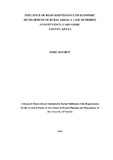| dc.description.abstract | The rapid deterioration of rural roads is one of the more challenging issues facing many countries in the developing world today. Generally, rural areas serve as the base for the production of food and raw materials, the major sources of capital formation for a country and a principal market for domestic manufactures. In Kenya, rural roads maintenance is a real challenge in most constituencies and Moiben Constituency is not an exception. There has been an increase in rural poverty with majority of farmers not being able to access markets for their agricultural produce and neither can potential investors able to be attracted to invest in these areas. The purpose of this research was to establish the influence of road maintenance activities on development of rural population. The study was conducted in Moiben Constituency, Uasin Gishu County, Kenya. The study objectives included to; establish the influence of road maintenance timing on economic development of rural areas; asses how road drainage structure maintenance influence economic development of rural areas, asses on how funding of roads maintenance influence economic development in rural areas and assess how community involvement level influence economic development of rural areas. The target population for the study comprise of KeRRA staff, and residents of Moiben. This target population was deemed relevant since they are directly involved in either road maintenance or utility of the roads. A sample size for the study was selected through use of Krejcie and Morgan Table which gave a sample size of 380 respondents. The respondents were selected through stratified, simple random sampling and purposive sampling techniques. The data for the study was collected through the use of questionnaires and interview schedules. The questionnaire was validated and tested for reliability prior to administration to the field. The data collected was analysed using descriptive and inferential methods to which presentations were made using frequency distribution tables. The results indicated that timing of road maintenance is poor and more reactive; drainage structures maintenance was significant in economic development; there were multiple sources of funds for road maintenance which resulted in lack of accountability and responsibility for road maintenance and finally it found out that the level of community involvement was low resulting in wrong prioritization of roads maintenance.The study recommends that; KeRRA and contractors must ensure their time plans are adhered to so as to facilitate passable roads; KeRRA should ensure they factor in the budgets the cost of maintaining drainage structures and enforce the maintenance; The national government should allocate adequate funds to road maintenance so that farmers not to incur cost on roads repairs and also road maintenance agencies in the rural areas must fully involve all the stakeholders including the residents in order to ensure achievement of good rural roads that will spur development. | en_US |

